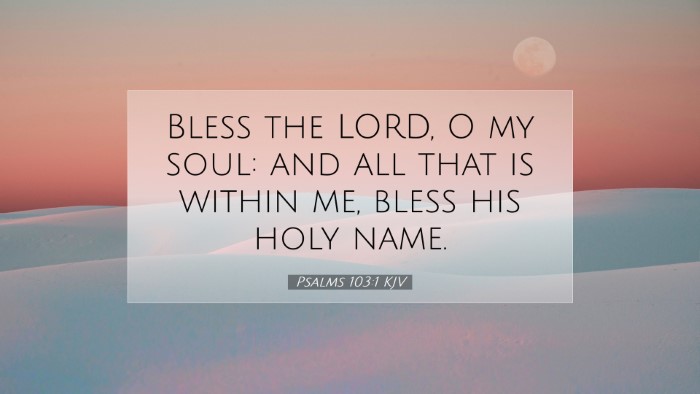Commentary on Psalms 103:1
Verse Context: Psalms 103:1 states, "Bless the LORD, O my soul: and all that is within me, bless his holy name." This opening line of a psalm that celebrates the goodness and mercy of God encapsulates both a call to worship and an invitation to personal reflection.
The Call to Bless the Lord
Matthew Henry highlights the significance of the command to bless the Lord. He emphasizes that this blessing is not merely an outward expression but an inward attitude of reverence and gratitude. He notes that to "bless" the Lord means to acknowledge Him for His goodness and to ascribe to Him the honor due to His name.
Albert Barnes further expounds on this thought, indicating that the phrase “my soul” denotes the innermost aspect of the speaker's being. It calls for a complete engagement of one’s self in worship. This injunction emphasizes that our praise should not be superficial but should encompass our whole being — our thoughts, emotions, and actions.
The Wholeness of Worship
Adam Clarke comments on the phrase "all that is within me", suggesting that true worship is holistic. It is an all-encompassing worship that arises from one’s innermost character and intentions. Clarke stresses that the psalmist invites themselves to introspection, where one acknowledges the manifold blessings of God, prompting a sincere outpouring of praise.
The Nature of God’s Name
The reference to God’s "holy name" serves to underline His purity and majesty. Matthew Henry notes that God's name represents His character and attributes, each deserving honor and reverence. This is a reminder that the act of worship is not just about our emotional state; it is deeply rooted in understanding who God is.
Albert Barnes elaborates that God's holiness signifies His separation from sin and His moral perfection. Praising His holy name thus involves recognizing His transcendence and the beauty of His virtue. It is an invitation to dwell on His moral attributes and respond with reverent awe.
The Significance of Naming in Worship
In the context of Hebrew thought, names carry with them the essence of existence. Adam Clarke points out that invoking the holy name of God entails acknowledging the greatness of His attributes — His mercy, love, justice, and faithfulness. The psalmist recognizes that as we bless His name, we align ourselves with His divine character and purpose.
The Personal Element of Worship
Psalms 103:1 is intensely personal. "O my soul" indicates a personal commitment to worship. Matthew Henry reflects on the intimate relationship between the psalmist and God, a dynamic characterized by personal devotion and an understanding of God's gracious deeds. This personal note calls for each individual worshiper to reflect on their own life and the blessings they have received.
Albert Barnes emphasizes that true worship must arise from a heartfelt acknowledgment of God's goodness as displayed in one's own life experiences. He exhorts believers to remember and recount God’s mercies, thus fueling their worship with testimonies of His faithfulness.
Encouragement for the Congregation
Adam Clarke expresses that worship is communal as well as personal; hence, the encouragement of individuals to bless the Lord has implications for corporate worship. When believers collectively lift their voices in exaltation, the church as a body reflects the glory of God's name, affirming communal identity in Christ.
Application for Today’s Believer
The exhortation of Psalms 103:1 carries powerful implications for contemporary believers. It reminds each individual to cultivate a lifestyle of gratitude and worship. Matthew Henry advises that regular reflection upon God’s benefits and mercies leads to a more profound and genuine practice of worship, enhancing both personal faith and corporate gatherings.
Furthermore, Barnes underscores that believers today are also called to engage fully in worship, integrating their entire selves into the process. This involves disciplining thoughts, emotions, and actions to align with God’s virtues during times of worship, fostering an atmosphere that honors His holiness.
Encouragement for Prayer and Praise
Clarke offers practical insights. He encourages believers to adopt a grateful mindset, using the psalm as a template for prayer. Individuals can take time to meditate on God’s past blessings, allowing personal experience of His goodness to fuel praise and worship. This practice aids in fostering a deeper comprehension of God’s nature and cultivating a heart of thankfulness.
Conclusion
In summary, Psalms 103:1 serves as a profound reminder of the nature of worship, urging believers to engage their entire being in blessing the Lord. Through understanding the implications of praising God's holy name, we are drawn into a deeper relationship with Him, encouraging gratitude and reverence in our lives.
Thus, for pastors, students, theologians, and scholars, this verse provides not only a theological foundation for understanding worship but also practical guidance for living a life that honors God through perpetual praise.


